“Becoming Italian Through Food, Family, and Life in the South” is Bret Thoman’s new book. Although his maternal grandparents were from Liguria, Bret didn’t grow up identifying with his ancestral heritage. As a teenager, Italy meant pizza, pasta, the Godfather trilogy, and pretty girls! However, following a study opportunity in Florence and a work program in Southern Italy, Bret embarked upon a lifelong journey to learn Italy’s history, culture, language, and become a true Italian. Eventually he married Katia (from Puglia) and they now live with their three children in Marche.
Although there is plenty of factual information, you’ll be delighted and sometimes surprised by Bret’s experiences of adapting to his new home. Enjoy reading and watching this month’s “Chat with and Expat”!
Where were you born and raised, and educated?
I’m from Georgia, outside of Atlanta. I was born in East Point, Georgia which is just outside of Atlanta, and grew up in a suburb called Peachtree City where I attended elementary/middle and high school. I then went to the University of Georgia and majored in Italian. From there I went to graduate school and did a master’s degree through Middlebury College where the Italian program included an academic year in Florence.
Why Italian studies?
I was a 19 year old student at the University of Georgia and needed to take a language course for three quarters of a year. I already studied two years of Spanish in high school and wanted to do something different but wanted to stick with a European language. French seemed pretentious, but Italian intrigued me. I think it was because I had a bit of an Italian heritage. My grandmother’s maiden name was Bacigaluppi. The embarrassing part (of my decision) is that I like pasta, pizza, and the Godfather trilogy. I thought Italian wine was cool and that Italian girls were pretty!
It took off when I signed up for a year in Italy. I fell in love with Italy because it was so different than anything that I had experienced in my young life. I was struck by the history and culture.
Did you grow up with any Italian traditions in your home?
The only Italian tradition was my mother’s innate knack for making lasagna. That’s about it. My grandmother’s family were in San Francisco. My great grandfather and his brother were named Paolo and Giovanni Bacigaluppi. They emigrated from Liguria near Genoa and sailed by ship in the 1860’s all the way to South America, around the continent, and landed in San Francisco. They stayed there for generations until my mother met my father. He was a pilot and assigned to work in Atlanta. So, they married in California and moved to Georgia. Georgia was far from my Italian roots and anything to do with them. My mother does remember the old school ways where her grandmother would cook for the kids. She would make homemade pasta. As kids, we did go to San Francisco for Christmas and Easter.
When did you become fluent in Italian?
Italian 1, 2, and 3 in university laid the foundation. It wasn’t until I got to Italy and spent a summer in Florence that I became conversational. Now I am married to an Italian woman. We pretty much speak half and half. Our youngest child only speaks Italian. I speak to our three kids in English to reinforce it.
My Italian continues to get better and better, but I’ll always have an American accent.
Language is so broad. I’m still amazed how many expressions there are and then there’s the dialects.
You need the foundation and then the immersion for it to all come together.
Give us some history about how you ended up living in Italy?
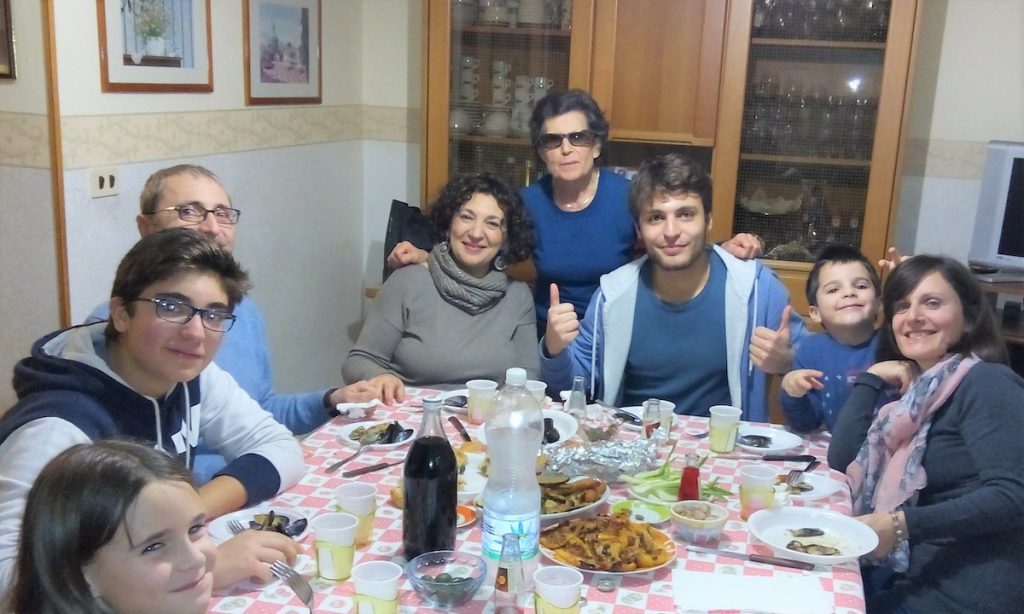
It’s not something that I could have foreseen twenty years ago. It was one step at a time and started with the language. There was a curiosity through the study abroad program. Then when I returned, I wanted more. So, I majored in Italian and then I spent a summer doing volunteer work with Volunteers for Peace in Southern Italy. It was a two-week program, but I stayed for two months. There I got an authentic Italian experience. Even the locals wondered why I was there and I intrigued them. I got to know Puglia, Sicily, and Naples. To me, the south was more Italian.
I made lifelong friends there and, in the process, met my future wife. After I finished my master’s degree, I took a little break from Italian and got my pilot’s license and did other things. But after four years I returned to Italy and reconnected with Katia. We eventually married and lived in Atlanta for ten years.
After 911 the whole industry changed, so we wanted to start a travel company and organize group trips to Italy.
It’s been back and forth and hasn’t been linear. Now, we’ve been in Italy for the past seven and a half years.
Moving to Italy and Citizenship
Some things have changed since publishing my book. Now there are incentives for Americans to come to Italy. This is very new, and recently the Italian government is encouraging people to come into Italy. Traditionally, it has been difficult for anyone outside of the EU to move to Italy. (I have citizenship through marriage.) There now are incentives especially for retirees like very low tax regimes — even for people who wanted to start a business. The Italian government is in the process of making a new law for Digital Nomads.
This is huge for Italy because it has had a real ‘brain drain’. Young people can’t find jobs. The Italian government that is glacially slow, is now realizing that they need more people there.
Did you marry in the US or Italy?
That’s a good question. We wanted to marry in a church in Italy, but in the early 2000’s this was difficult (on the American side). An attorney advised us to marry in the US. Then, Katia applied for a change of status from a tourist visa to a permanent resident. Eventually, we married in Italy.
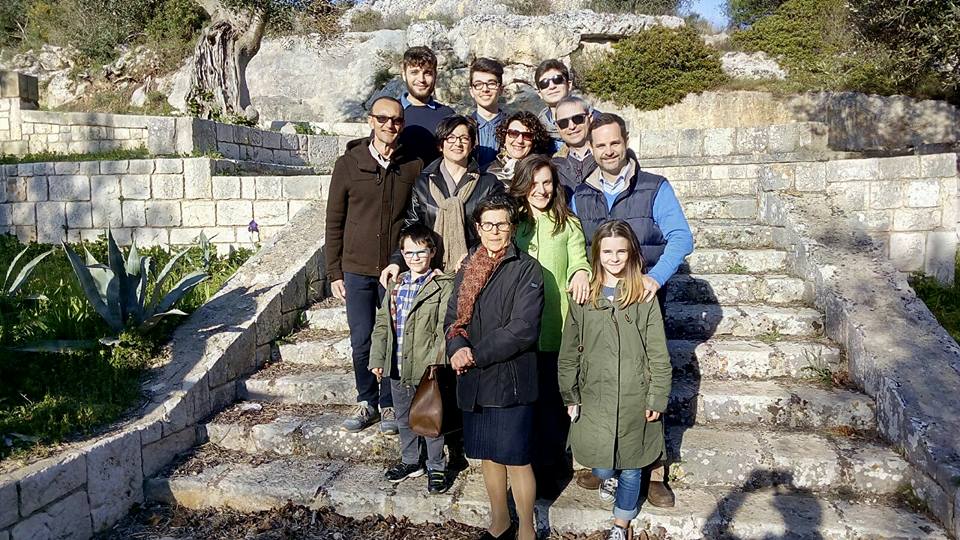
It was like “My Big, Fat, Greek Wedding”! Ten of my family members and friends attended and then about one hundred and fifty were from her side! My family doesn’t dance and sing, but Italians do — the men would take me and launch me up in the air! The girls would do the same with Katia. By the end of the night, my mother and father (who don’t dance) were up on the dance floor.
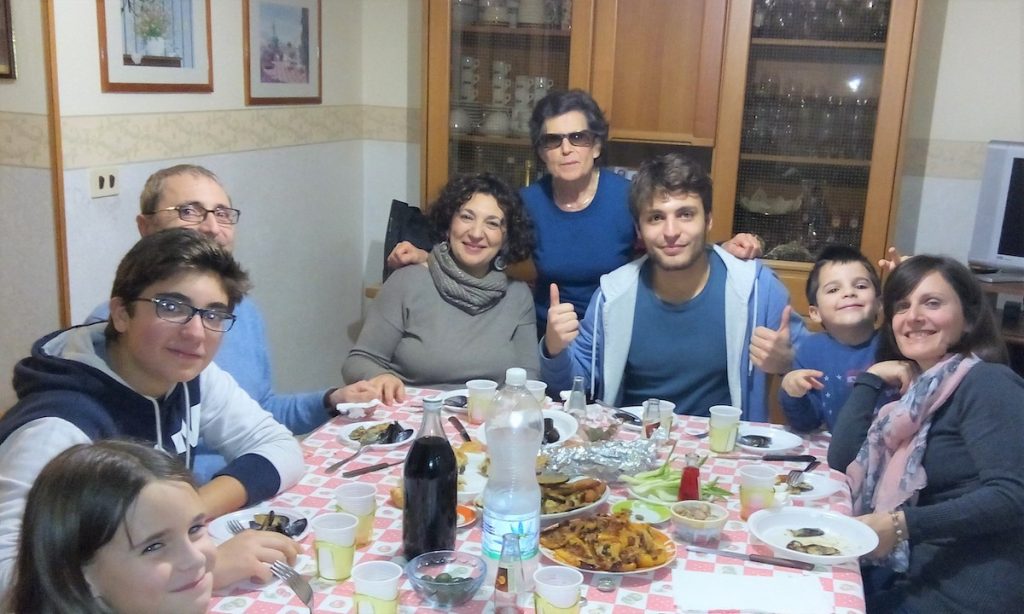
Our honeymoon was kind of weird because we had already traveled to get there [to Puglia]. We passed through Rome, Florence, and Umbria. It was a wonderful experience.
Tell us about your children.
Clairemarie is our oldest and she’s 17. We have Jacopo who is 14, but turning 15 in a month. Our little guy, Michael is 4 ½. Our oldest was born in Atlanta. Jacopo was born near Bari, and Michael was born where we are now, Ancona.
Childbirth and healthcare in Italy
Americans are accustomed to a certain level of healthcare, service, and comfort. We did not pay one euro for childbirth, but there is no customer service or level of comfort. You do not get an epidural in an Italian hospital unless you have a serious reason to get it. I’ll leave it there and you can read more in that chapter.
What are the advantages of raising children in Italy?
The advantages are having our kids close to us. Like I said, we lived in the US for 10 years together and our daughter went to school there through third grade, and our son through kindergarten. My wife felt that there were all these things pulling them away from us and the school day is longer. Here they get out every day at 1 pm for lunch and they go on Saturday too [to make up for the shorter week days].
The towns are smaller and everything is closer. I don’t think we would have had that same connection if we had done this in the US. Our daughter is now the equivalent to a sophomore in the US and will soon go to college. Here, a lot of the kids still stay and go to a local college. You are with your kids a lot more and much closer to them. I’m here a lot too and have a close relationship with my daughter and sons.
I think that the whole college partying thing that happens in the US is tamer here. Although, my daughter tells me that I just don’t know what happens here.
Is it easier to limit your kids access to technology?
I think that’s exactly what it is. I will say that I think that the culture has changed since the pandemic. There was a lot of technology here (videos and phones). But, unfortunately during the pandemic and the schools closed for a long time, the kids got conditioned by cell phones. For two years, they were looking at their phone for six hours a day because of school.
I believe as a parent, that regardless of all this stuff, if a child has a good relationship with the parents that it is overarching. It can out influence what they see in the media.
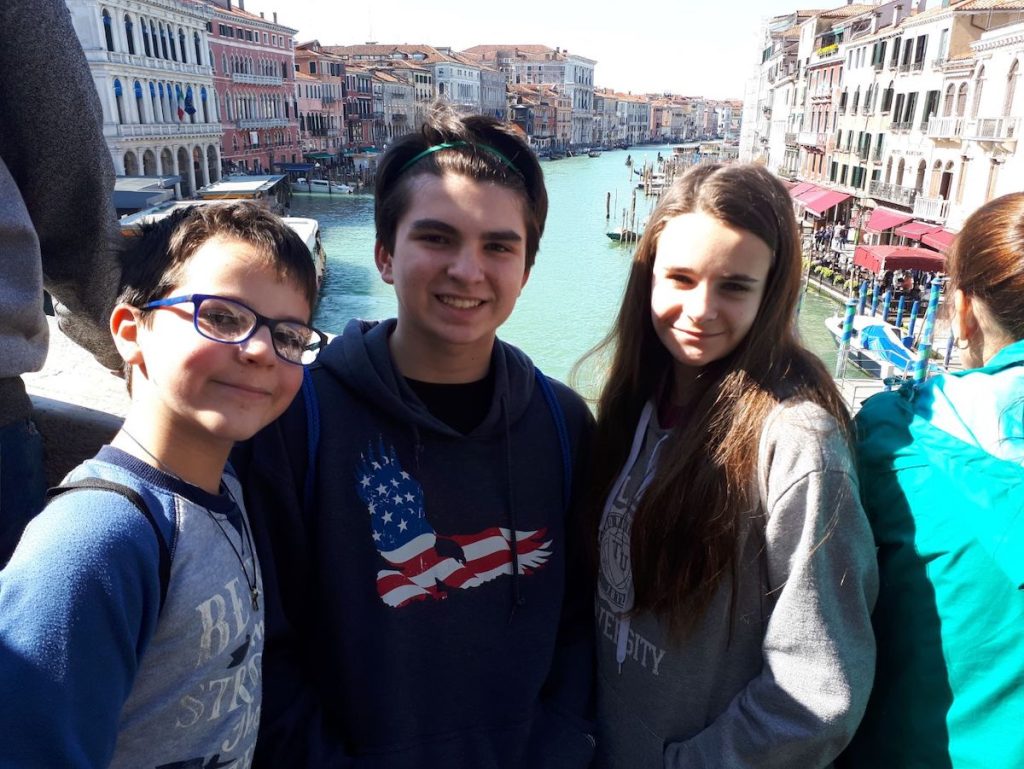
The Piazza
One thing about the piazzas is that it’s multigenerational. In the US, the parents go out together, the old people are together, and kids do their play dates and stuff. And people live so far away from each other that there’s no intergenerational connection. Here, elderly people are sitting together with children near them kicking the soccer ball. Then the teenagers are together, but still interact.
Disadvantages of raising children in Italy.
The biggest doubt that I continue to have on my mind is the opportunities for our children down the road. I mentioned before about the brain drain. Young people get super educated here and then there aren’t any opportunities for them. They almost all go abroad. Researchers or advanced scientists go to either the UK or US. And if they do find a job, the salaries are very low. There are benefits like healthcare that are built into it, but there’s not a lot here economically.
I think for young people and families, it’s wonderful to raise them here. They’re not pressed with competition and the sports. When we go home to visit, I see parents boasting and bragging about their kids looking for scholarships. They don’t have that here because there’s just nowhere to go.
Do you feel that the Italian education system prepares them well to work abroad?
The English that they learn here is very basic. I am concerned whether they will have the base foundation should I want to send them to the US for high school or college.
You’ve written ten books. What are the others about?
My other books are not about Italy. The company that I started focuses on religious, Catholic, St. Francis pilgrimages. So, most of the other books are about saints, or walking (camino) pilgrimages that you can do in Italy and guidebooks to support my business.
This book came about because I had lots of stories about my experiences. It was during the pandemic and I was making these YouTube videos telling people what was happening in Italy (that was two weeks ahead of the US and other parts of the world). During that time my business was closed and so I decided to start writing. I had an idea at the back of my head and originally it was going to be about Italy. Then I realized that there are so many books about Italy. Each chapter of “Becoming Italian” begins with factual information and then follow it up with my own experience and how it relates to it.
I wanted it to be fun, humorous, and a little witty, but also informational since I have a master’s degree in the language with a broad knowledge of Italian culture.
How long did it take to write Becoming Italian: Through Food, Family, and Life in the South?
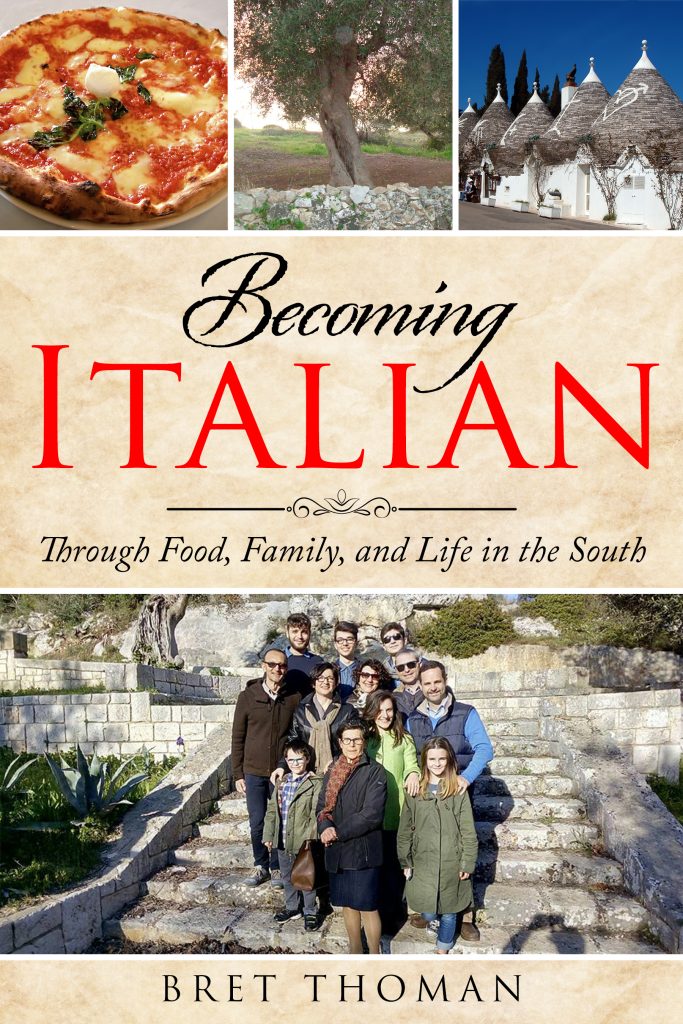
Initially, I thought about releasing it in three different sections. I did the first one in about a month. I ended up writing the second and third section together which took about six weeks. It’s an involved process, but I enjoy it.
I believe that everyone (especially once you are over 40) has a book in their head.
Did you discover something about yourself that you weren’t expecting?
No. I can’t think anything off the top of my head. Sometimes my personality can be very direct so the whole section about the birth and the shouting match at the hospital, looking back — I’m not proud of that.
Tell us about St. Francis Pilgrimages (Bret and Katia’s Tour Company)
St. Francis Pilgrimages was an idea that I had in 2004 to bring mostly North Americans to Italy and initially, to walk in the footsteps of St. Francis. We go through Assisi, Rome, and Tuscany. It’s been successful because we know the places, language, culture, and people.
Opening a business is easier in the US than in Italy. I don’t want anyone to be discouraged by what I wrote about in the book. Now, the Italian government is finally supporting entrepreneurs. (At least supporting people who are coming in from the outside with the idea of starting a business.)

New Income Tax Laws for Foreigners
They are now allowing newly established residents (Italian or not) to come in for five years and take advantage of a new tax regime in which you pay taxes only on 30% of your entire earnings. Also, an Italian could leave the country for two years, come back in, and take advantage of this.
You can extend it for another five years and you’ll pay only 10% of your entire income. It’s very attractive. My experience was different. I was looking at paying 70% in income tax which is not possible. I think that the Italian government realized that there was so much tax evasion that they needed to make it work.
It’s something that I found out recently by joining a Facebook group called Americans in Italy. People were talking about it: especially retirees. They are doing a 4% income tax for retirees from anywhere in the world if you’re drawing a pension or social security. There are some limitations and only five regions in Southern Italy (including Sicily, Puglia, Campania) and it must be a town of only 20,000 residents.
Note: Listen to more on this subject at (1:00) on our YouTube channel — that will be published soon. We were not able to find a website from an Italian government source that specified this change, but you can read more here.
What is your definition of an expat?
I have never really liked that term because ‘ex’ to me, means ‘no longer’. This doesn’t apply to me because I’m an American citizen and love my country. I go back as often as possible and am very attached to my home country. I am also very Italian and convey that in my book.
There are expat communities especially in Tuscany and Rome where a lot of Americans just associate with each other. Whenever I find Americans in Marche, I want to meet them because I miss Americans.
What is important for foreigners to know when adapting to life in Italy?
I would say that you really need trustworthy guidance. Even when I was meeting with this couple from California yesterday, I felt that they didn’t have good guidance. They didn’t restore the home the way that they wanted to. Frankly, Italians don’t know where we’re coming from, our background, or how the country works. So, there are little pitholes that you just have to fall into.
Now especially with these new tax regimes, there’s a flood of Americans coming over here. I see on Facebook that they really want to come. But Italy has such a reputation of being slow or sweeter country: la dolce vita. It’s true and Italy’s definitely sweeter in many ways than where we come from.
In some cases, it’s like the stereotypes. If you’re not careful, they’ll take advantage of you. When I was starting my business, a wise man told me that you want to find somebody who can help you like a brother. I also ask my wife Katia.
An Italian said to me, “Bret, do you know what your problem is? You’re an American living in Italy, but you’re reasoning like an American living in Italy. If you’re going to be successful here, you need to reason like an Italian.”
Is there anything that you’ve found in Italy, but don’t necessarily have in the US?
I feel at home here. There are other places that I’ve gone to and can’t wait to leave because I don’t have a kindred spirit with that place.
Where do you see yourself in the next ten years?
I wouldn’t mind going back to the US for part of those ten years. I’d like my kids to now have an American experience. Maybe finish high school or college there. But then beyond that, I want to be here. When I’m 60, I want to root down and have a place here where people can spend a period of time. It will probably be in Umbria and near Assisi and have at least three bedrooms with private baths and entrances. They can have a nice experience like I’ve had.
“Becoming Italian : Through Food, Family, and Life in the South” on Amazon
St. Francis Pilgrimages
Facebook | YouTube

